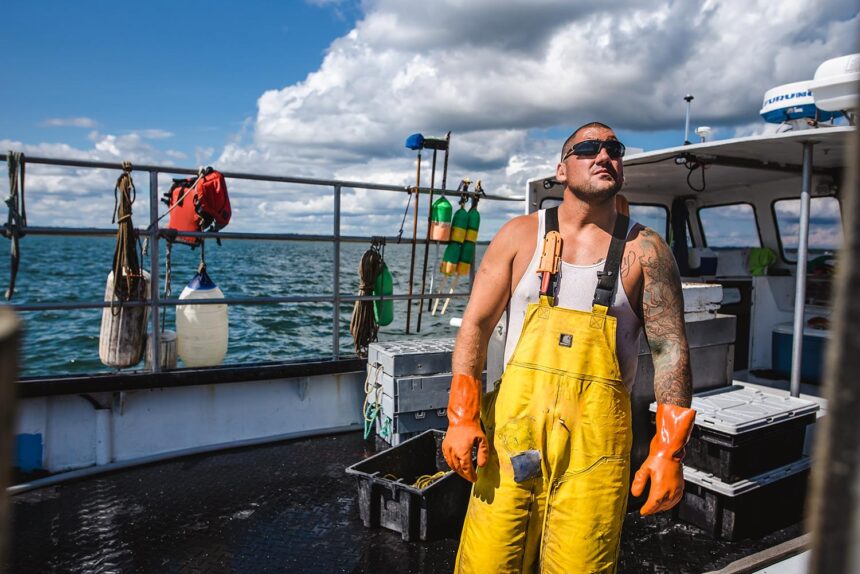New England’s Fishermen and Offshore Wind Energy: A New Era
The serene waters of New England are witnessing a transformative story that merges the age-old practices of fishermen with the emerging sector of renewable energy. As wind turbines begin to dot the skyline, many local fishermen are discovering ways to adapt to this shift towards offshore wind energy, seeing it as an opportunity rather than a threat. However, this potential for synergy is challenged by vocal opposition from former President Donald Trump, who has sparked a heated debate regarding energy policies, environmental concerns, and the livelihoods tied to fishing. This article explores how New England’s fishing community is navigating these changes while facing political headwinds that could disrupt their progress.
Fishermen Adapting to Renewable Energy Initiatives
In an impressive shift in perspective, fishermen along the coast of New England are beginning to view offshore wind energy as a partner in their endeavors rather than an adversary. By embracing this sustainable resource, they recognize that offshore wind can harmoniously coexist with traditional fishing methods—creating opportunities for both economic growth and ecological preservation. Notably, many have observed that constructing wind farms can lead to artificial reefs which enhance marine biodiversity and potentially increase fish stocks nearby.
This transition demands collaboration and flexibility among stakeholders. Fishermen have started engaging in planning discussions with developers, articulating their concerns while influencing project designs to reduce interference with fishing activities. This cooperative strategy has yielded several positive outcomes:
- Job Opportunities: The offshore wind sector is set to generate new jobs across manufacturing, maintenance, and operational roles.
- Ecosystem Protection: Local fishermen advocate for approaches that safeguard marine habitats while tapping into renewable energy sources.
- Diverse Economies: Shifting towards green energy promotes economic diversification essential for sustaining coastal communities.
The ongoing transition toward sustainability illustrates how innovation can complement tradition without sacrificing heritage or livelihoods; however, looming political shifts—especially from influential figures like Trump—pose risks that could undermine these advancements and compromise hard-won agreements between fishermen and renewable advocates.
Addressing Conflicts Between Fishing Rights and Renewable Development
The intricate relationship between fishing rights and expanding renewable energy (is becoming increasingly significant within communities across New England). Fishermen who have long relied on Atlantic resources now face new challenges brought about by offshore wind farm expansions. Through collaborative initiatives involving various local fisheries organizations engaging directly with developers,
efforts are underway aimed at minimizing conflicts over shared ocean spaces while promoting sustainable practices.
This dialogue seeks solutions respecting both fisherman livelihoods alongside regional goals for renewable development; emphasizing innovation need not come at tradition’s expense.
.
The recent political climate adds urgency; particularly due support from figures like Trump advocating against offshore projects raises stakes considerably.
Fisherman now call upon clearer regulations protecting their interests without hindering growth within renewables sector.
By devising strategies integratingfishing operations &energy production , all parties involved may work toward mutually beneficial compromises.
Main components include:
- Sustained dialogues b etween fishers & developers
- < b >Research assessing impactsof w ind farms on ecosystems
li > - < b >Potential leasing arrangementsallowing joint use o f ocean space
li >
< /ul >< b >Stakeholders th > < b >Concerns th > < b >Proposed Solutions th > Fishermen Losing access t o key fishing grounds Create protected zones f or commercial fisheries E nergy Developers Navigating regulatory hurdles
Create streamlined permitting processes < td>E nvironmental Groups
< td>P otential ecosystem disruptions
< td>C omprehensive impact assessments prior t o project initiationPolitical Changes Impact on Renewable Energy Projects: The Role of Trump’s Opposition
A surprising turn in discussions surrounding renewable energies has emerged through former President Donald Trump’s recent statements which have ignited considerable controversy overwind initiatives particularly affecting regions such as N ew E ngland .</ p>
<p><br />
Local fisherfolk find themselves at crossroads after initially addressing apprehensions regarding off shore developments only now facing renewed uncertainty . While numerous workers established compromises enabling sustainable coexistence , T rump ’ s push favoring fossil fuels threatens disruption against these hard-earned agreements . Such implications risk escalating opposition towards initiatives once embraced by locals creating discord between conservation efforts versus traditional sectors reliant upon fossil fuels.</ p><p><br />
As T rump ’ s administration rallies behind rolling back w ind projects stakeholders throughout N ew E ngland grapple potential fallout arising from shifting policies . Key issues raised include : p >- < li style ="margin-bottom : 10px ;">< strong>E conomic stability : strong>L ocal economies dependent upon both fisheries & sustainable energies may suffer fluctuations resulting policy directions changing rapidly .< br />< li style ="margin-bottom : 10px ;">< strong>E nvironmental consequences : strong>T he conflict raises questions surrounding long-term viability concerning w ind power combating climate change amidst pro-fossil fuel sentiments prevailing today .< br />< li style ="margin-bottom : 10px ;">< strong>C ommunity relations : strong>P eople previously skeptical about w ind farms might feel betrayed given evolving narratives undermining trust necessary future collaborations moving forward .
  ;
To highlight centrality issues presented consider table below illustrating job impacts projected should current trends continue :
< b >& #xA0;Employment Sector < /th > & #xA0;Projected Jobs With Wind Initiatives < /th > As N ew E ngland navigates its coastal resource future , stories emerging from local fisherfolk exemplify resilience adaptability amidst change occurring around them . By forging common ground alongside off shore developments they not only protect livelihoods but also contribute significantly broader conversations regarding sustainability environmental stewardship overall .
However looming threats posed politically — especially those stemming influential individuals like D onald T rump — underscore contentious intersections existing among local interests ,energy policy climate change alike .
Moving forward requires collaboration understanding all sides ensuring traditional industries innovative solutions coexist benefiting communities environments alike .








